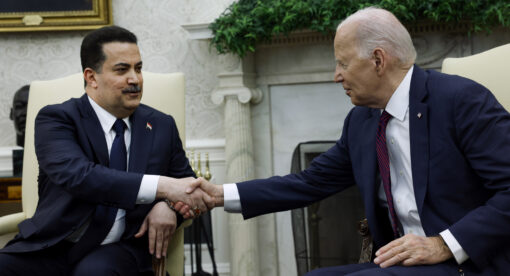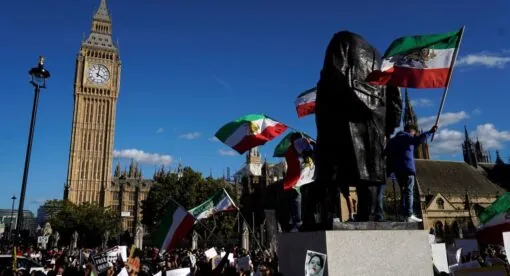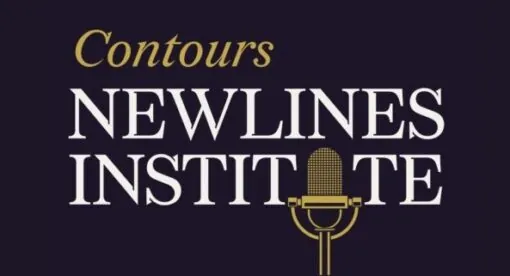The Weekly Forecast Monitor is a forward-looking assessment of geopolitical dynamics that are shaping the international system. Download PDF version.
Global Hotspot Tracker
The Global Hotspot Tracker examines the outlook for key geopolitical hotspots around the world. (Go to the Global Connectivity Tracker)
Middle East/North Africa Regional Tensions
Summary – The death toll in Gaza passed 30,000 this week, as tensions continued to trend toward military escalation and diplomatic de-escalation scenarios. Tensions have increased between Israel and Hezbollah as Israel continues to plan a Rafah offensive and mediators try to secure a cease-fire.
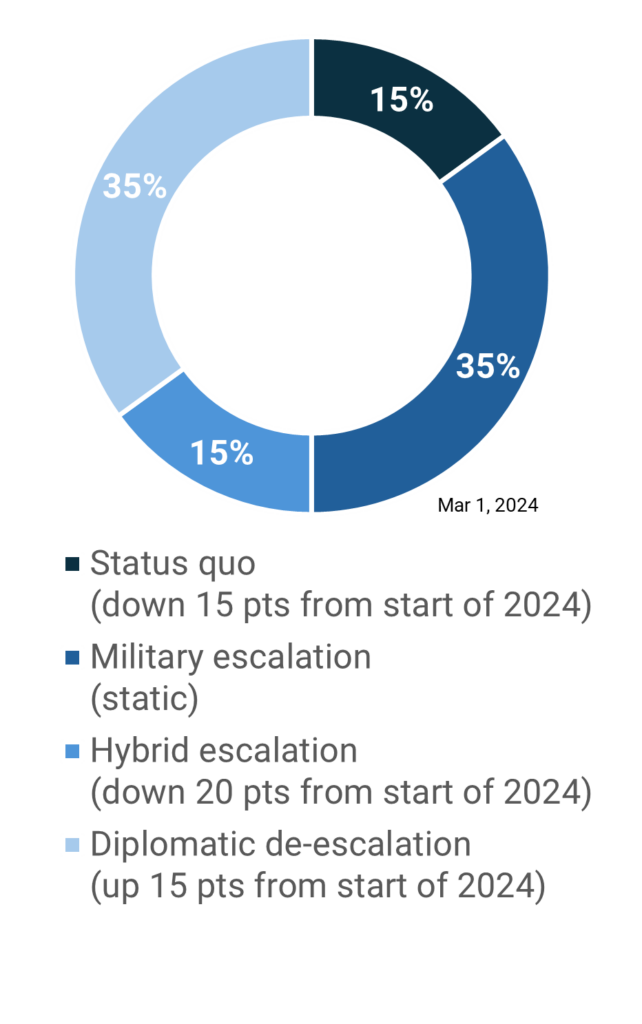
Military escalation scenarios
- Hamas said the deaths of more than 100 Palestinians in Gaza waiting in line for humanitarian aid could derail the current cease-fire talks.
Risk level – medium - In its deepest strike into Lebanon, Israel hit targets in the city of Baalbek. Hezbollah responded by launching rockets at an Israeli aerial surveillance base. This comes as the Israeli defense minister said Israel would increase strikes against Hezbollah.
Risk level – medium - The IDF presented its plans for civilian evacuations in Rafah, but the details are unknown.
Risk level – medium - Israel’s defense minister said Israel would increase strikes against Hezbollah personnel in Lebanon and that the group has been unable to replace commanders killed in Israeli strikes.
Risk level – medium/low
Hybrid escalation scenario
- U.S. Secretary of State Anthony Blinken stated that current plans for an expansion of Israeli settlements in the West Bank were “inconsistent with international law,” a major U.S. policy shift.
Risk level – low - The Iran-backed Houthis announced they would continue attacks in the Red Sea and introduce “surprises.”
Risk level – medium
Diplomatic de-escalation
- Cease-fire talks continued this past week. A senior Hamas official stated “wide gaps” remained in the Israeli proposal and that Hamas would need to meet with mediators again.
Opportunity level – medium
Russia/Ukraine Conflict
Summary – The Russia-Ukraine conflict is trending toward a military escalation scenario as Putin warned of the use of nuclear weapons in the event of a direct NATO intervention in the conflict. Russia also made further gains in villages near the eastern Ukrainian city of Avdiivka, and Ukraine warned of a new Russian offensive being prepared for the summer. There are also continued signs of a hybrid escalation scenario as EU and U.S. officials weigh using frozen Russian assets to fund Ukraine.
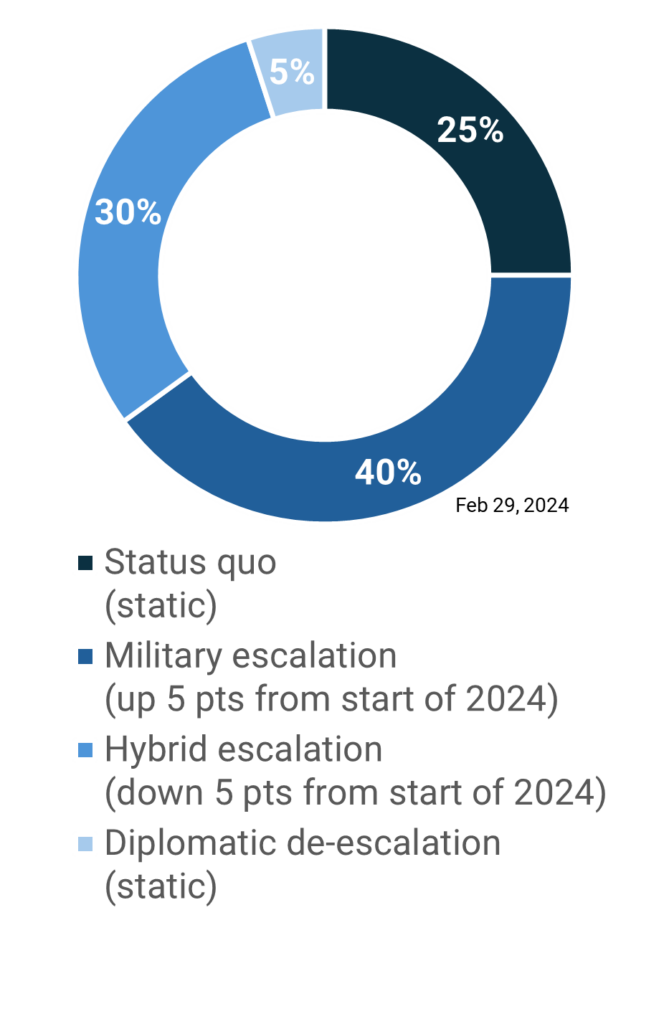
Military escalation scenarios
- French President Emmanuel Macron said “nothing should be excluded” regarding the possibility of NATO sending ground troops to Ukraine. The U.S., U.K., and Germany subsequently ruled out this option, while Moscow warned that a direct Russia-NATO conflict would be inevitable – including the potential use of Russian tactical nuclear weapons – if this were to occur.
Risk level – low - Ukrainian forces withdrew from several villages near the city of Avdiivka in eastern Ukraine following its capture by Russia in recent weeks as Russian forces took more advantageous positions in the region.
Risk level – low - Ukrainian President Zelenskyy warned that Russia is preparing a new offensive against Ukraine in the summer.
Risk level – medium - Leaked Russian military files revealed that Russia has a lower threshold for using tactical nuclear weapons than previously known publicly.
Risk level – low - Pro-Russian forces in the separatist region of Transnistria appealed to Russia for “protection” from Moldova.
Risk level – medium
Hybrid escalation scenario
- EU and U.S. officials advocated for the use of Russian frozen assets to provide economic and security support for Ukraine.
Risk level – low - The widow of late Russian opposition figure Alexei Navalny, Yulia Navalnaya, called on European politicians to seize assets of Russian President Vladimir Putin and his inner circle.
Risk level – low - China warned against the U.S. imposing sanctions on Chinese companies for Russia-related reasons.
Risk level – low
Diplomatic de-escalation
- Switzerland said it was ready to host a senior-level peace conference on the war in Ukraine, though Russia rejected the idea as “ridiculous” without Russian participation.
Opportunity level – low
China/Taiwan/U.S. Tensions
Summary – Tensions between China and Taiwan continued to trend toward both military and hybrid escalation scenarios, as negotiations to resolve a dispute related to the death of two Chinese fishermen in February have been unsuccessful. China has increased patrols around Taiwan’s Kinmen Island and has crossed into restricted waters. China’s coast guard also increased activity in waters near Japan and the Philippines. This all comes as the U.S. is investigating and looking to restrict Chinese access to sensitive information about Americans and U.S. infrastructure.
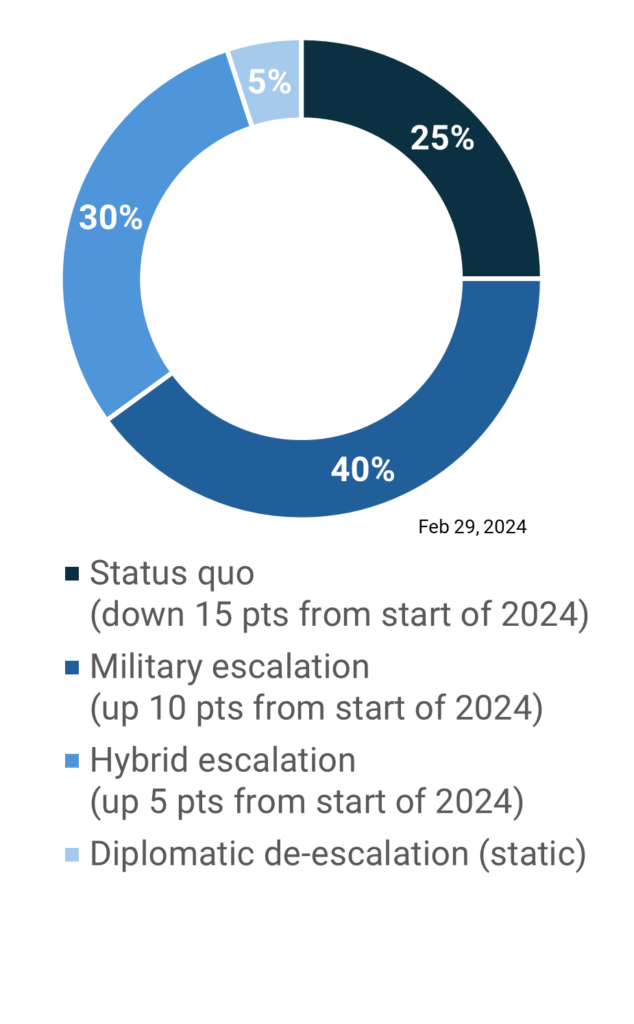
Military escalation scenarios
- The Chinese coast guard has been more active this week, increasing patrols near the Philippines, Japan, and Taiwan. This comes as 11 Chinese coast guard ships patrolled around Taiwan’s Kinmen Island; two of them crossed into restricted waters.
Risk level – low/medium - China announced plans to expand the number of civilian flights using a controversial flight path that comes within kilometers of the median line in the Tawain Strait.
Risk level – low/medium - Japan announced plans to construct bomb shelters in southern regions close to Taiwan (some as close as 11 kilometers). It also announced it is preparing proposals for air and sea evacuations of residents living on islands with military facilities that could be targets in a potential conflict in Taiwan.
Risk level – low
Hybrid escalation scenario
- China responded to the U.S. report to the World Trade Organization on China’s WTO compliance, saying the U.S. was engaging in smear tactics and was “extremely irresponsible.”
Risk level – low/medium - The U.S. Department of Commerce plans to open an investigation into sensitive data collected by Chinese vehicles in the U.S. This could lead to import restrictions in the future.
Risk level – low - The U.S. moved to restrict data brokers transferring sensitive information about Americans in bulk data transfers to “countries of concern,” including China.
Risk level – low/medium
Diplomatic de-escalation
- China and Taiwan continued negotiations to resolve a dispute over the death of two Chinese fishermen earlier in February. Some negotiation sessions have ended abruptly with lots of shouting, according to reports.
Opportunity level – low
Global Connectivity Tracker
The Global Connectivity Tracker examines the impact of geopolitical dynamics on global energy security and the climate transition. (Go to the Global Hotspot Tracker)
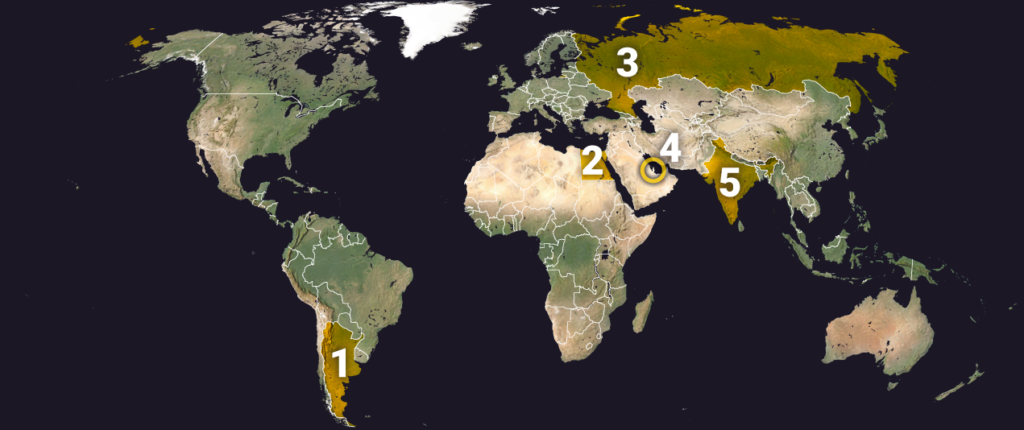
Energy/Climate
- Argentina
What happened: The principal oil-producing regions of Argentina (southern Chubut province) have issued a warning about the possibility of supply disruptions to other parts of the country because of reductions in funding that President Javier Milei has imposed.
Significance/Outlook: If the Ministry of Economy has not provided the financial resources to the southern provinces (oil producing regions), production may be halted not only in Chubut but in all of Argentina’s fields. Because of the conflict, it is probable that Argentina will be unable to maintain its capacity regarding the maintenance of its oil production and delivery networks. Because the majority of Argentina’s oil production is consumed within the country, the influence on the domestic market is moderate, while the impact on international markets is low.
Risk level – low - Egypt
What happened: BP plans to invest $1.5 billion in Egypt as the country’s gas output falls. This investment is expected to occur during the next three to four years as part of the gas-focused joint venture with Abu Dhabi National Oil Co.
Significance/Outlook: Gas production growth in Egypt in 2024 is at its lowest levels in years, increasing uncertainty about the Egyptian gas export market. This is mainly due to ongoing Red Sea disruptions and delays in building additional gas pipelines, which will likely contribute to a further decline in Egyptian LNG exports. Foreign investments will speed up development and production plans to meet growing demand in Egypt and support the country’s efforts to export energy surpluses.
Opportunity level – medium
- Russia
What happened: Russia has implemented a measure that prohibits the export of gasoline for six months beginning on March 1.
Significance/Outlook: At the local level, these measures are important for Russia to tackle the issues of internal gasoline shortages and excessive prices. Ukrainian drones have attacked Russian energy assets, including oil stations, in recent months. Stabilizing the price of gasoline is especially important for Russia ahead of a presidential election March 15-17. Most of the countries that import the most gasoline from Russia – including Nigeria, Libya, and Tunisia – are in Africa.
Risk level – low - Qatar
What happened: QatarEnergy plans to expand its LNG export capacity by 85% by 2030, after finding large additional gas quantities in the North Field West project.
Significance/Outlook: These developments are expected to boost Qatar’s LNG production capacity. With global LNG demand estimated to increase by more than 50% by 2040, Qatar will have leverage to maintain its position in the global energy market. Qatar’s LNG is more attractive to consuming countries, like India or China, who are concerned about secondary sanctions from Russia. In addition, more investments in LNG means lower GHG emissions and a step closer to Qatar achieving its decarbonization plans.
Opportunity level – medium - India
What happened: A new set of U.S. sanctions against Russia is increasing concerns in India about crude oil imports from Russia.
Significance/Outlook: In the years following Russia’s invasion of Ukraine, Indian refiners enjoyed high refining margins and profits as they imported Russian crude below the $60/barrel price cap. The United States started sanctioning more Russian firms’ tankers and vessels in February 2024, so India is concerned that this will impact its crude import plans (and increased freight rates amid attacks in the Red Sea complicate matters). That may force India to buy more oil from the Middle East instead, to avoid secondary sanctions.
Risk level – low
Key Stat of the Week
A full 40% of all the new LNG that will come to the global market by 2029 will be be from Qatar, according to QatarEnergy’s chief executive Saad Sherida Al-Kaabi.
To get more in-depth analysis of these issues and learn more about analytical products from New Lines Institute, contact us at [email protected] and visit https://newlinesinstitute.org/analytical-products/.



